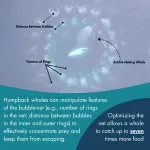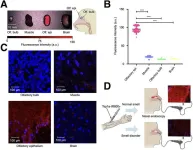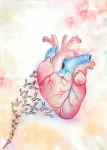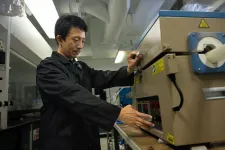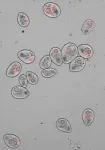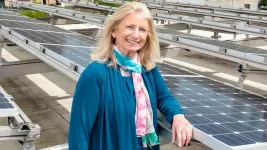(Press-News.org) Scientists have found a new way to predict how proteins change their shape when they function, which is important for understanding how they work in living systems. While recent artificial intelligence (AI) technology has made it possible to predict what proteins look like in their resting state, figuring out how they move is still challenging because there is not enough direct data from experiments on protein motions to train the neural networks.
In a new study published in the Proceedings of the National Academy of Sciences on Aug.20, Rice University’s Peter Wolynes and his colleagues in China combined information about protein energy landscapes with deep-learning techniques to predict these movements.
Their method improves AlphaFold2 (AF2), a tool that predicts static protein structures by teaching it to focus on “energetic frustration.” Proteins have evolved to minimize energetic conflicts between their parts, so they can be funneled toward their static structure. Where conflicts persist, there is said to be frustration.
“Starting from predicted static ground-state structures, the new method generates alternative structures and pathways for protein motions by first finding and then progressively enhancing the energetic frustration features in the input multiple sequence alignment sequences that encode the protein’s evolutionary development,” said Wolynes, the D.R. Bullard-Welch Foundation Professor of Science and study co-author.
The researchers tested their method on the protein adenylate kinase and found that its predicted movements matched experimental data. They also successfully predicted the functional movements of other proteins that change shape significantly.
“Predicting the three-dimensional structures and motions of proteins is integral to understanding their functions and designing new drugs,” Wolynes said.
The study also examined how AF2 works, showing that combining physical knowledge of the energy landscape with AI not only helps predict how proteins move but also explains why the AI overpredicts structural integrity, leading only to the most stable structures.
The energy landscape theory, which Wolynes and his collaborators have worked with over the decades, is a key part of this method, but recent AI codes were trained to predict only the most stable protein structures and ignore the different shapes proteins might take when they function.
The energy landscape theory suggests that while evolution has sculpted the protein’s energy landscape where they can fold into their optimal structures, deviations from a perfectly funneled landscape that otherwise guides the folding, called local frustration, are essential for protein functional movements.
By pinpointing these frustrated regions, the researchers taught the AI to ignore those regions in guiding its predictions, thereby allowing the code to predict alternative protein structures and functional movements accurately.
Using a frustration analysis tool developed within the energy landscape framework, researchers identified frustrated and therefore flexible regions in proteins.
Then by manipulating the evolutionary information in the aligned protein family sequences used by AlphaFold and in accordance with the frustration scores, the researchers taught the AI to recognize these frustrated regions, enabling accurate predictions of alternative structures and pathways between them, said Wolynes.
“This research underscores the significance of not forgetting or abandoning physics-based methods in the post-AlphaFold era, where the emphasis has been on agnostic learning from experimental data without any theoretical input,” Wolynes said. “Integrating AI with biophysical insights will significantly impact future practical applications, including drug design, enzyme engineering and understanding disease mechanisms.”
Other authors include Xingyue Guana, Wei Wanga, and Wenfei Lia at the Department of Physics at Nanjing University; Qian-Yuan Tang at the Department of Physics at Hong Kong Baptist University; Weitong Ren at the Wenzhou Key Laboratory of Biophysics at the University of Chinese Academy of Sciences; and Mingchen Chen at the Changping Laboratory in Beijing.
The work was supported by the National Natural Science Foundation of China; Wenzhou Institute, University of Chinese Academy of Sciences; Hong Kong Research Grant Council; and the U.S. National Science Foundation-funded Center for Theoretical Biological Physics at Rice.
END
Researchers teaching artificial intelligence about frustration in protein folding
2024-08-20
ELSE PRESS RELEASES FROM THIS DATE:
Novel molecular imaging tool objectively measures and diagnoses smell disorders
2024-08-20
Reston, VA (August 20, 2024) -- A new fluorescent imaging probe can for the first time objectively and non-invasively measure loss of smell, clinically known as anosmia. Targeting the olfactory nerve, the new tool has potential to eliminate biopsies used to diagnose certain anosmia conditions and to aid in the development of therapeutic interventions. This research was published in the August issue of The Journal of Nuclear Medicine.
Research shows that an estimated 13.3 million adults in the United States have a vast range of smell disorders and that ...
Tiny killers: How autoantibodies attack the heart in lupus patients
2024-08-20
New York, NY—August 20, 2024—Cardiovascular disease is the leading cause of death in patients suffering from lupus, an autoimmune disease in which our immune system attacks our own tissues and organs, the heart, blood, lung, joints, brain, and skin. Lupus myocarditis--inflammation of the heart muscle-- can be very serious because the inflammation alters the regularity of the rhythm and strength of the heartbeat. However, the mechanisms underlying this complex disease are poorly understood and difficult to study.
A long-standing question about lupus is why some patients develop myocarditis while others remain unaffected. And why the clinical manifestations of affected ...
Study: Temporarily removing firearms from people at risk of harm saves lives
2024-08-20
DURHAM, N.C. – An estimated one life was saved for every 17 times an extreme risk protection order removed guns from people who presented a risk of harming themselves or others, according to a Duke Health-led analysis of the laws in four states.
Extreme risk protection orders -- known as ERPOs or “red flag laws" -- are civil court orders that temporarily prevent people from accessing firearms after a judge determines that they pose an imminent risk of harming themselves or others. Twenty-one states and the District of Columbia have enacted ERPO laws, mostly in ...
Study finds Americans want pandemic-era ease of applying for Medicaid
2024-08-20
More than 23 million Americans who were granted Medicaid coverage during the COVID-19 pandemic lost their coverage starting in March 2023 after the pandemic was declared no longer a public health emergency. Many likely will not successfully re-enroll on their own given Medicaid’s administrative burden—the frustrations and challenges people often encounter in seeking or complying with coverage.
Now, a study of the so-called Medicaid Great Unwinding by Dr. Simon F. Haeder with the Texas A&M University School of Public Health, ...
It only takes 15 minutes to change your health
2024-08-20
Corporate Cup, lunchtime yoga, or even ‘walk and talks’, organisations come up with all sorts of wellness initiatives to encourage people to be more active in the workplace. But before you duck and hide, new research shows that all it takes is 15 minutes and a touch of gamification to put you on the path to success.
Assessing results from 11,575 participants, across 73 Australian, New Zealand, and UK companies, University of South Australia researchers found that a gamified workplace wellness program – the 15 Minute Challenge* - leads to substantial increases in physical activity levels, with 95% of participants meeting (36%) or exceeding (59%) ...
Nadia Drake joins SETI Institute Board of Directors as observer
2024-08-20
August 20, 2024, Mountain View, CA –The SETI Institute announced that Dr. Nadia Drake is joining the SETI Institute's Board of Directors as an observer. The SETI Institute's board guides its strategic direction, finances, and various committees. As a journalist, Drake will be an active, non-voting member, bringing her broad expertise to the team.
"I am thrilled by this appointment to the SETI Institute's board, which comes at an exciting time for the SETI Institute and for the search for life beyond Earth," said Drake. "For most of my career as a science journalist, I've covered astrobiology ...
Organized youth sports are increasingly for the privileged
2024-08-20
COLUMBUS, Ohio – A sweeping study of U.S. youth sports participation over the past 60 years found that there has been a significant increase over time in kids playing organized sports – but particularly among more privileged, educated families.
A national survey found that about 70% of Americans born in the ’90s and reaching age 18 by 2015-16 said they took part in organized sports through recreational, school, or club teams. This finding showed a rather steady increase in organized sports participation across generations. Slightly more than half of those ...
UCF researcher develops lotus-inspired tech to convert CO2 to fuels, chemicals
2024-08-20
Video available here.
In an effort to reduce the environmental impact of carbon dioxide emissions, a University of Central Florida researcher has developed a new technology that captures carbon dioxide and outputs useful fuels and chemicals.
Yang Yang, an associate professor in UCF’s NanoScience Technology Center, created an innovative device that captures carbon dioxide with a microsurface comprised of a tin oxide film and fluorine layer. The device then extracts gaseous carbon dioxide via a bubbling electrode and selectively converts ...
Predation drives opportunistic bacteria to become more virulent
2024-08-20
Opportunistic pathogens are typically benign microbes that can sometimes cause infections in individuals with weakened immune systems or when they gain access to sterile areas of the body. Unlike obligate pathogens, opportunistic pathogens do not depend on host infection or transmission for survival, making it difficult to determine the factors driving the evolution of virulence in these microbes. Nevertheless, given their potential to cause severe infections in immunocompromised patients and the increasing prevalence ...
Renewable energy policies provide benefits across state lines
2024-08-20
While the U.S. federal government has clean energy targets, they are not binding. Most economically developed countries have mandatory policies designed to bolster renewable electricity production. Because the U.S. lacks an enforceable federal mandate for renewable electricity, individual states are left to develop their own regulations.
Marilyn Brown, Regents’ and Brook Byers Professor of Sustainable Systems in Georgia Tech’s School of Public Policy; Shan Zhou, an assistant professor at Purdue University and Georgia Tech Ph.D. alumna; and Barry Solomon, a professor emeritus of environmental policy at Michigan Technological University, investigated ...


